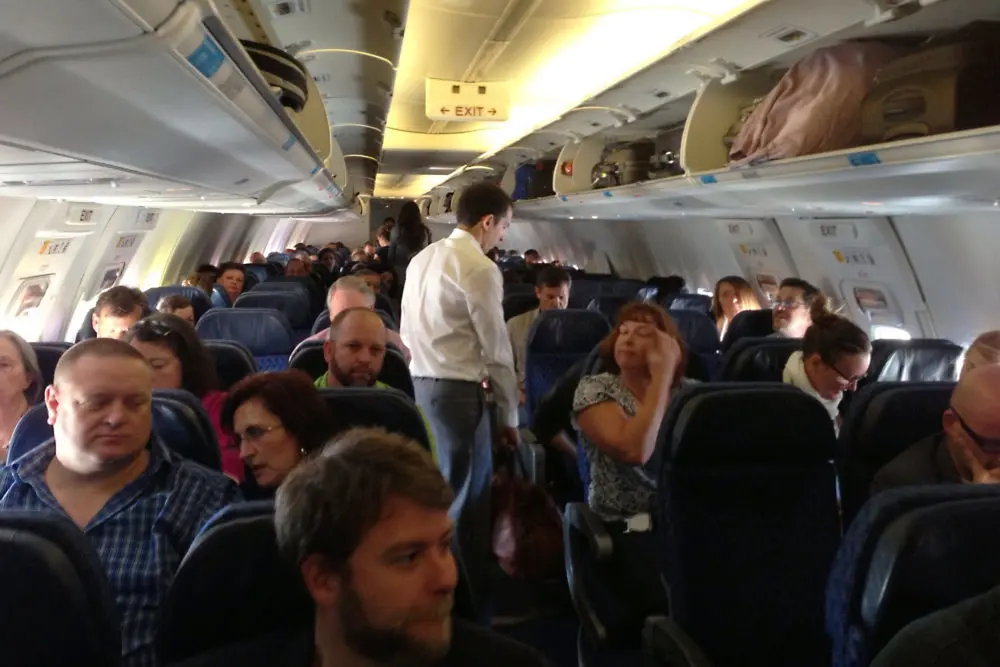It didn’t take the latest string of viral videos to convince Cynthia O’Leary. There was no need to see the near-riot at Fort Lauderdale-Hollywood International Airport or the passengers brawling on a flight at Burbank Bob Hope Airport.
She refuses to fly anymore.
“We’re driving,” says O’Leary, a software developer from Tampa.
Jeff Kolker won’t travel either. “I’m not flying this year,” says Kolker, an accountant from Pryor, Okla. He’s planning trips to Montreal and Halifax, Nova Scotia, this summer. That’s more than 30 hours of driving.
In case you missed those viral video clips, here’s a recap: Earlier this month, a passenger aboard a Southwest Airlines flight from Dallas, bound for Oakland, Calif., came to blows with another traveler during a stopover in Burbank and was later arrested. A few days later, a brawl erupted between passengers and sheriff’s deputies after Spirit Airlines canceled nine flights in the wake of a labor dispute.
The “Dao” effect is raising question about air travel
The incidents follow the forcible removal of David Dao from a United Airlines flight from Chicago to Louisville, last month, also captured on video. That led to congressional hearings and promises by airline executives to “do better.” It also made travelers like O’Leary swear off air travel — especially on United Airlines, which she says is on her personal blacklist.
But these latest kerfuffles are raising new questions: Will anything change? What, if anything, can passengers do — besides drive — as they face one of the most uncertain summers for air travel in more than a decade?
“The frustration of passengers is reaching a breaking point,” says Theresa Skarsten, a small-business owner from Bend, Ore., and a frequent flier. “The airlines only care about profits, not customer service. They’re cramming us into smaller and smaller seating, flights are late and the excuse is usually maintenance.”
Change will not happen overnight, despite viral videos
Experts say the frustration is real, but change isn’t easy.
“While I think all of us who travel would love to believe this is a tipping point in the relationship between passengers and the airlines it simply is not true,” says Catharine Curran, an associate professor at the Charlton College of Business in North Dartmouth, Mass. “There will be superficial changes.”
Some consumer advocates are hopeful that they can use the momentum generated by the outrage to put the force of law behind the voluntary measures now being adopted by airlines. Flyers Rights, a passenger advocacy group, last week sought to persuade lawmakers to enact tough laws that would effectively suspend overselling of airline seats, stop airlines from denying boarding to ticketed passengers and loosen federal laws that make disobeying the flight crew a felony, among other steps.
“It is obvious that airline passenger mistreatment is not isolated and will not be solved by relying on airline promises or voluntary policies,” says Flyers Rights president Paul Hudson.
The Federal Aviation Administration Reauthorization Act, which is up for renewal later this year, may include a few new rules. And if public outrage cools between then and now, those measures could be watered down or dropped entirely. Other federal agencies, including the Transportation Department, Department of Homeland Security and Federal Aviation Administration, can also act to help passengers, Hudson says. But for now, they’ve chosen not to.
Airline industry doesn’t want new rules
The airline industry says it doesn’t need any new rules. Air travel is safer than ever and incidents like this month’s are rare, according to Vaughn Jennings, a spokesman for Airlines for America, an airline trade group. “Our commitment to customers is treat everyone who flies with dignity and respect,” he says.
So what should air travelers do in the meantime? It’s all about self-empowerment, experts say. “Passengers should do their research,” says Kevin Mitchell, who represents corporate travel interests in Washington as the chairman of the Business Travel Coalition. He suggests that you carry a copy of your rights with you when you’re in transit.
In fact, at least one organization, Travelers United, is working with airlines to more prominently post basic consumer laws in airports. Airlines have so far resisted disclosing these essential rules.
Here’s the reality of flying now
If nothing else, these incidents have shown how unpredictable air travel can sometimes be. And whether you’re a fan of regulation or think the industry already has too many rules, there’s probably one thing everyone can agree on: You never know what’s going to happen. (Related: Will the long airport lines of spring break 2016 be back again this year?)
“Always buy travel insurance,” says Ben Baldanza, the former chief executive of Spirit Airlines.
When the uncertainty of air travel is too much, you can always do what O’Leary and Kolker have done — take a break from flying. (Here’s how to get a refund on a nonrefundable airline ticket.)
If that’s not practical, then at least don’t forget to pack your patience and politeness this summer, as well as a cellphone with a charged battery. And you know where to find my advocacy team. After all, you never know when you’ll be sitting next to the next viral video drama.




